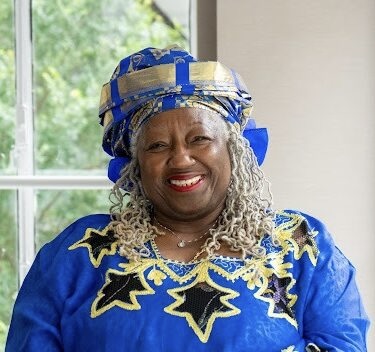Biography
Early Life
Cathy Royal, a Yoruba priest, educator, and activist, has made important contributions to applied behavioral sciences and organizational development.
Cathy’s roots run deep in Alabama, where she was born to parents Geraldine and Landrus Dunlap. However, she was raised in Detroit.
Her stepfather, Joseph, served as a preacher and dedicated activist. Her household often hosted influential figures such as Reverend C.L. Franklin and Reverend Dr. Martin Luther King Jr.
To Cathy, these men were her father’s friends. However, they were also the men who tirelessly fought for civil rights and inspired her with their wisdom and kindness.
They not only welcomed her curiosity but also took the time to answer her questions, igniting young Cathy’s passion for justice.
Her mother, Geraldine, and her circle of friends, the “charming ladies of the morning,” further nurtured her commitment to social justice.
These women were unsung heroes, who worked behind the scenes to support the Civil Rights Movement. They provided safe and discreet meeting spaces and even offered scholarships.
Academic and Professional Achievements
After seeing the riots of the 1960s while at Wayne State University and earning her Ph.D. in Human and Organization Systems from The Fielding Institute, she became a respected professional in Human and Organization Development.
Royal’s contributions include the development of Quadrant Behavior Theory (QBT), designed to address systems of exclusion in societies.
She founded her own company called the Royal Consulting Group and taught at Colorado Technical University (CTU).
Royal influenced students, colleagues, and academia as a whole in her role as an adjunct professor at CTU.
She earned accolades such as the 2023 Gestalt Institute Outstanding Graduate and the 2015 Woman of the Year from CTU, and actively participated in shaping educational content for universities and textbook developers.
Some of her other accolades include the Spirit of Detroit Award (1976), the Congressional Task Force on Women Award (1984), and the Fielding University Social Justice Award (1994).
International Impact and Advocacy
Royal’s work extends far beyond the U.S.
Her international engagements reflect her work on affirmative identity, gender, and appreciative inquiry at conferences in South Africa, Nepal, and the United Nations-sanctioned African Family Reunion in Colombia.
In collaboration with many international organizations such as the World Bank Group, she helped them in their understanding of social justice in Africa and the United States.
In addition to her professional endeavors, Royal is a founding Elder of the Council for Global Ancestor Reverence, an organization dedicated to educating and advocating for the importance of ancestors in the spiritual lives of people across the diaspora.
Priesthood and Legacy
Royal faced hurdles in the path to becoming a priest as she confronted forms of misogynoir within Yoruba spaces.
Nevertheless, she embraced this role not only to honor her roots but also to blaze a trail for Black women aspiring to follow her lead and to advocate for the inclusion of African Traditional Religions in all spheres.
For Royal, being a priest transcended titles. Her priesthood influenced her work in appreciative inquiry and social justice. It enabled her to address issues with an understanding of the human spirit.
Her legacy stands as a testament to the fusion of spirituality and scholarship. Through her dedication to education, social justice, and the empowerment of marginalized communities, Cathy Royals’ life is a beacon of inspiration for making a better world.

